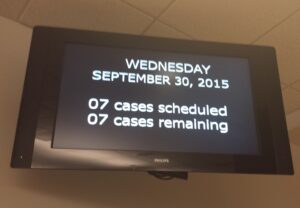A few weeks ago, I had the pleasure/obligation of serving jury duty at the Phoenix Municipal Court. In general, I’m in favor of the jury duty system. Having a case decided by a jury of your peers with a judge in place to ensure that the case is conducted properly is formula for fair results. My friend and colleague who is a judge told me that most of the time in his opinion and experience, juries make the right decision.

Even though I was unhappy about having to give up a day of work to be there, I understand why jury service is important. I appreciated that the prospective jurors were given free parking and access to a free coffee and cocoa machine in the jury waiting room. They even tried to make it entertaining by playing movies and having handouts of word searches and Sudoku games available.
The problem with jury duty is related to the fact that many cases don’t settle until the last minute. The court doesn’t know how many cases will actually need a jury. They only know how many cases might need a jury. There was a screen in the jury waiting room that kept us abreast of how many cases were left to start or settle that day.

One of the most frustrating aspects of the day was knowing that I couldn’t serve more than one day. I work in an eat-what-you-kill environment so if I don’t work, I don’t make any money. I cleared my calendar for one day of jury duty but the next was as full as ever with client work and meetings. If I wasn’t selected for a jury by lunch, the chances of a case selecting a jury, presenting all the evidence, and the jury deliberating and reaching a verdict before 5pm was low. I felt like my afternoon was a waste because I knew I couldn’t serve on a duty for a 2-day trial and the environment wasn’t conducive to getting any real work done.
If I could tweak the jury duty system, these are some of the changes I would implement:
Secondary Screening of Potential Jurors. Upon arrival, jurors should be given the chance to complete a form explaining why they couldn’t serve on a multi-day trial if requested. Those forms would be reviewed by an appropriate person at the court who would determine who has a valid reason. If those people aren’t selected before the lunch break, they will be released. Knowing that certain jurors will be released if not selected in the morning might motivate lawyers and defendants to start their case in the morning.
Decide on Trial the Day Before. The parties have until the last minute to decide if they will take a plea and whether a jury will be necessary. If the parties are forced to decide the day before, the court will have a better idea of how many potential jurors are needed for the next day. On my day of jury service, there were seven cases that might need a jury, but only one panel was called.
Courthouse Co-working Space. With movies playing in the main jury waiting room, it was too loud for productive work. There was a “quiet room†but it was too small and much of it was like a medical waiting area rather than a practical work space. The quiet room at jury duty should be more like Co+Hoots with copious table space and outlets and soundproof walls so outside noises won’t cause disruptions.
I never made it out of the jury waiting room during my day of service. I impatiently watched the screen showing how many cases were left to begin that day, especially in the afternoon, since I knew I wouldn’t be selected for jury service. As soon as the person in charge of the jury waiting room announced at 3:30 that we were being released, I was out the door in a flash.